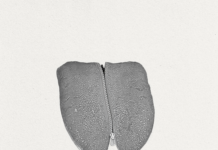I have always enjoyed it here, at night, after the day’s heat and dust have passed. I sit in shadow, beneath a young elm whose leaves flit back and forth in the breeze, scattering light and dark across the table’s marbled surface, from the electric light which stands on the opposite curb. I sit near the street, away from both the bustle of the passersby and the voices from inside the café, away from everyone else but not, unfortunately, from myself. I am my own constant, regrettable companion.
As the saucers slowly stack up with each freshly poured glass, while my wits are still about me, I observe the quiet carnival passing by. Two young boys, neither of whom should be out on the streets after midnight, laughing and punching each other’s arms as they appear and then disappear into the darkness. A black-shrouded priest, vestments rustling, perhaps hurrying home to the rectory after administering last rites to some dying soul. A fresh-faced soldier, his arm around a working girl, whispering in her ear, his brass badge gleaming in the gaslight. For a moment he reminds me of Roberto, but the impression just as quickly vanishes.
I am always the last to leave. The other customers are here only briefly, their visit only momentary, the café a mere preliminary to the all-night bars and bodegas, the loud and boisterous places I’ve never had much use for, not even when I was young. I am here for the quiet, the reflection, the numbing. Although most think I am deaf, I hear as much as I need to hear. Tonight, even from a distance I hear the younger waiter’s irritated grousing, and the older waiter’s patient sympathy. Perhaps they remember the night I slipped away in a blur, wandering home without paying my bill, and are keeping a wary eye on me.
Of course they are talking about me, about my unfortunate incident, about my despair. Of course I was in despair. Who would not be, in my situation? What did I have left, after Anselma, after Roberto? After influenza took my wife, and the números my only son? I saw little left to live for. But I don’t fault Maria for saving me, for cutting me down from the rafters. She did what any good Christian would do. My niece fears for my soul, believes it’s a sin to take one’s life into one’s own hands, to subvert God’s will. Not that I believe any of that nonsense, nor have I for many years now. But let Maria, bless her, keep believing, it that helps her get by.
The two waiters idle beneath the overhang, near the café’s side door, the same two who work here every night. The younger one is impatient, as if he has somewhere more important to be, and sometimes rude—he just told me he wished my attempt on my own life had been successful, clearly thinking I couldn’t hear him in my supposed deafness. Not that I entirely disagree with him, of course, but he should have shown enough respect to keep his wishes to himself. He is also sloppy in his serving. He spilled much of his last pouring, dousing the saucer with liquor, something I never do no matter how inebriated I become.
He reminds me a bit of Roberto—passionate, impulsive, careless. But that is saying nothing unique, for nearly every young man reminds me, in some way, of Roberto. The waiter, the soldier passing in the street, the plátano seller in the market square, the landlady’s nephew. Such is the price of remembrance, of being wealthy yet not enough so to perpetually stay numbed in drink, ignorant or at least indifferent to my worldly cares. I did well enough in my profession, but not enough so to afford true oblivion. That is the luxury of far richer men.
I glance down again at the marble table, beneath the stack of saucers which marks my debt for the evening. It occurs to me, although I cannot say for certain, that my own men may have quarried this very marble. I once owned a small quarry on the outskirts of town which employed twenty men at its peak and supplied all of the local craftsmen. This table, with its fine edges, sharp and square, appears to be the work of Padilla, my best customer in the old days. The quarry was a strong operation, quite profitable, but inevitably went downhill after Anselma, and especially after Roberto. As my sole heir, he would have taken over the quarry, but once he was gone and the nightly brandy took hold of me, my junior partner sold the business out from under me for a mere fraction of its worth. I must have signed the papers somehow, the documents placed before me and a pen put into my hand, signing it all away without knowing, or knowing but not truly caring.
The older waiter, on the other hand, seems to understand my longing, my need to linger, to stay here, alone, as long as possible. But the younger one rouses me, refusing me another and shooing me away at half past two, far earlier than I need. I rise, my knees bumping the table’s edge and rattling the pile of saucers, and settle up, leaving a half-peseta tip for his trouble. With sorrow I step into the darkened street, swaying as I regain my bearings. Though my eyes struggle to adjust to the darkness, my mind is still working well, too well, my thoughts coming far too easily. I have yet to master getting them to completely cease.
Tonight I will return to my lonely room, gaze up again at those rafters which remain inviting if not quite so much as that other night, and be alone with only memories for company, insistent companions which I wish would leave me be. But that, I know, is too much to expect. Though the brandy will eventually help me sleep, soon enough the daylight will jar me from uneasy slumber and back into remembrance, and it will be many hours before evening falls, blessedly, once again, hours before I can return to the cafe, to its bright and clean order, to its calm.
Hours before the brandy will soothe me back into forgetting.
Fiction Clean and Bright



